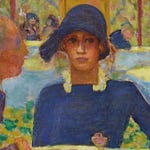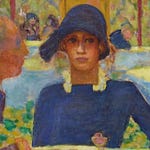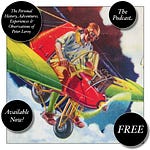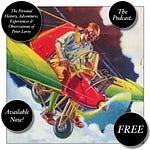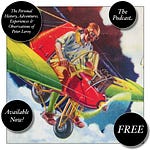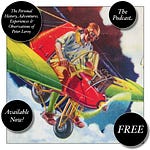One afternoon, at reading time, we settled onto the lawn, and Miss Louisa opened a book and said, “Today I’m going to read you a story called ‘The Fox and the Clam.’”
“I know that story,” I blurted out, surprised and thrilled. A new feeling arose within me, a warm and pleasant feeling. It was pride. I had already read the story of the fox and the clam, but the other children, to judge from their blank faces, hadn’t; that meant that I was in an elevated position, closer to Miss Emily and Miss Louisa than any of the others.
“I know it, too,” said Matthew. The sound of his voice stunned everyone. It attenuated my warm and pleasant feeling. Miss Emily recovered first; she bounded to Matthew and scooped him up.
“Oh, good, Matthew,” said Miss Emily. She enveloped him in one of her pillowy hugs. “And you, too, Peter, good for you.” She had Matthew squashed in her arms, with his head bent to one side, but nonetheless I could see when he looked at me that he wore the same malevolent smile he had worn when he’d palmed that lard sandwich off on me.
“Now, Matthew and Peter,” said Miss Emily, “since you and I already know the story, we’ll have to be very quiet while Miss Louisa reads, so that we won’t spoil it for the others, won’t we?”
“Yeah,” I said, crushed. Not until she had told me that I was going to have to be quiet did I realize that I had been hoping to parade my familiarity with the story, that I had intended to keep interrupting with “Here comes a good part,” or “Wait’ll you hear what happens to the clam!”
Miss Louisa began.
“Once upon a time, a fox was on her way home to her family. She had spent all day scrubbing floors in the palace of the lion, who was the king of all the beasts.”
I had been wearing a big smile and the condescending look of the cognoscenti, but now my heart began to pound and I broke out in a sweat because the story Miss Louisa was beginning was clearly going to be wildly different from the fox-and-clam story I knew. I felt, at the same time, three kinds of anxiety. The first was the anxiety one feels when one is watching an actor in a difficult role, a musician playing a difficult piece, an athlete attempting a difficult feat: it seemed to me that Miss Louisa was undertaking a stupendous effort of improvisation, and I was afraid for her, afraid that she couldn’t bring off the spontaneous construction of so vastly different a version of the story, afraid that she was going to make a fool of herself. The second was the anxiety one feels when one has pretended, in conversation, to have read a book that one has not and sees in the expression on the face of one’s interlocutor genuine interest, interest that is already forming into a question that one will not be able to answer: it seemed to me that, since I had claimed to know the story, Miss Louisa might at some point ask me what was going to happen next, and I would be the one to make a fool of himself. The third was entirely new to me: it was anxiety born of rivalry. I looked at Matthew. His expression had reverted to his habitual look of disappointment, and from it I couldn’t get any idea of what he was thinking. Since he stayed with the Leightons after the rest of us left, I wondered whether he had perhaps already heard Miss Louisa’s story, whether perhaps he already knew what Miss Louisa was going to say. Since he and I were the only ones who knew anything about the story, we were competitors, but it might well be that he had an advantage, inside information on Miss Louisa’s version of the story of the fox and the clam.
Miss Louisa went on. “Her knees were sore, and her hands were rough and chafed. Her body ached from the hard work she had to do. Her heart ached too, because she knew that she would have to go on doing this work until she died. ‘Oh,’ she wailed, ‘A fox’s life is a sorry life. I wish I could be some other animal.’
“Just then a fairy popped out from under a toadstool. ‘Your wish is granted,’ said the fairy, who had the power to grant wishes. ‘You may be any animal you choose to be.’
“The fox’s heart leaped up, and she skipped along, thinking about what animal she might become. While she skipped along, a small bird flew past her, and the fox said, ‘Oh, I think I might be happy if I were a bird like you. It must be wonderful to fly through the air instead of scrubbing floors.
“‘Does my life look good to you?’ asked the bird. ‘All day long I have been flying back and forth with worms in my mouth to feed my babies, who scream all the time. If that sounds good to you, then why don’t you take my place?’
“The bird’s life didn’t sound very good to the fox, so she went on. After a while, she saw a rabbit hop across the path in front of her, and the fox said, ‘Oh, I think I might be happy if I were a rabbit like you. It must be wonderful to spend all day hopping through the woods, so blithe and nonchalant.’
“‘Does my life look good to you?’ asked the rabbit. ‘Right now I’m running from a farmer who saw me eating cabbage in his cabbage patch. If he catches me, he’s going to impale me on the pitchfork he’s carrying. If that sounds good to you, then why don’t you take my place?’
“The rabbit’s life didn’t sound very good to the fox, so she went on. After a while, she came to a bay, and the fox said, ‘I’ll bet there are clams in this bay.’ And she called out to the clams, ‘Oh, I think I might be happy if I were a clam like you. It must be wonderful to spend all day resting in the sand.’
“‘Oh, yes,’ called a clam. ‘It is wonderful. We don’t have to hunt for food—we just stick our necks out and eat whatever comes along. We never have to bring food to our children, as the birds do—in fact, we never give any thought to our children at all. We never get chased by farmers, as the rabbits do. We don’t have any work to do for the King, as you do, and we don’t ever get sore knees, since we don’t have any knees. However—’
“The clam’s life sounded so very, very good to the fox that she didn’t wait for the clam to finish. She cried, ‘I wish to be a clam,’ and jumped into the bay. By the time she reached the bottom, she had become a clam, and she was happy.
“But just then, along came one of the Royal Clamdiggers, and he dug up the clam who had once been a fox. He took her to the Royal Cook, and that night she ended up in the Royal Stomach.”
Have you missed an episode or two or several?
You can begin reading at the beginning or you can catch up by visiting the archive or consulting the index to the Topical Guide.
You can listen to the episodes on the Personal History podcast. Begin at the beginning or scroll through the episodes to find what you’ve missed.
At Apple Books you can download free eBooks of “My Mother Takes a Tumble,” “Do Clams Bite?,” “Life on the Bolotomy,” “The Static of the Spheres,” “The Fox and the Clam,” and “The Girl with the White Fur Muff,” the first six novellas in Little Follies.
You’ll find an overview of the entire work in An Introduction to The Personal History, Adventures, Experiences & Observations of Peter Leroy. It’s a pdf document.





